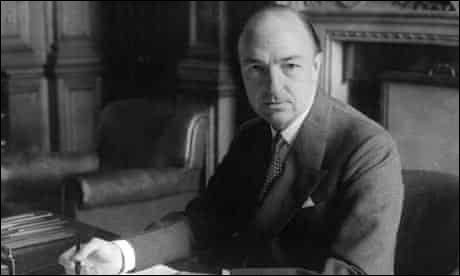On this day on 5th June
On this day in 1832 Thomas Creevey welcomes the passing of the 1832 Reform Act in a letter to Miss Old: "Thank God! I was in at the death of this Conservative plot, and the triumph of the Bill! This is the third great event of my life at which I have been present, and in each of which I have been to a certain extent mixed up - the battle of Waterloo, the battle of Queen Caroline, and the battle of Earl Grey and the English nation for the Reform Bill."
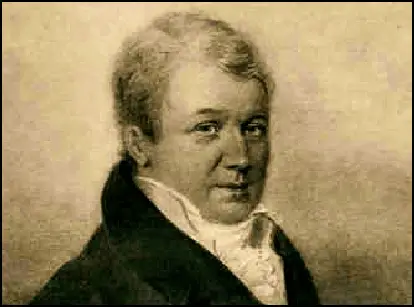
On this day in 1860 women's suffragist Mary Neal, the daughter of a successful businessman, was born in Edgbaston. She was educated at Birmingham Ladies' College but later became a student of economics.
Deeply influenced by the writings and speeches of Keir Hardie and Edward Carpenter, she was converted to Christian Socialism and lectured at the Nottingham Labour Church.
In 1890 Mary Neal became a voluntary social worker at the West London Methodist Mission. The following year she met Emmeline Pethick. The two women became close friends. Emmeline later commented that Mary had a "strong sense of humour and a profound aversion from unreality". As Elizabeth Crawford, the author of The Suffragette Movement (1999), has pointed out: "Emmeline Pethick and Mary Neal left the Mission in order that they might carry on their social missionary work free from what they had come to perceive as the restrictions of its Methodist ethos and without the restrictions of institutional living."
In 1895 Mary Neal and Emmeline Pethick formed the Espérance Club that was influenced by the ideas of William Morris, Edward Carpenter, and Walt Whitman. This involved helping a group of young women establish a co-operative dressmaking business, Maison Espérance, in Wigmore Street. In 1900 the two women developed a hostel at Littlehampton for working girls' holidays. However, the partnership broke up when Emmeline married Frederick Lawrence.
In 1906 Mary Neal joined the Women Social & Political Union. She later became a member of the national committee of the WSPU. Unlike her close friend, Emmeline Pethick-Lawrence, she refused to take part in any militant action.
Mary Neal joined forces with Cecil Sharp, the brother of Evelyn Sharp, in order to revive English Folk Dance. In 1910 she published The Espérance Morris Book, which includes detailed description of 12 Morris dances and a selection of folk songs. Later that year she travelled to the United States where she lectured on folk dance.
In October 1912, Christabel Pankhurst told Emmeline Pethick-Lawrence and Frederick Pethick-Lawrence about the proposed arson campaign. When Emmeline and Frederick objected, Christabel arranged for them to be expelled from the the organisation. Emmeline later recalled in her autobiography, My Part in a Changing World (1938): "My husband and I were not prepared to accept this decision as final. We felt that Christabel, who had lived for so many years with us in closest intimacy, could not be party to it. But when we met again to go further into the question… Christabel made it quite clear that she had no further use for us."
Mary Neal also left the WSPU and became a "special commissioner" for Votes for Women, a newspaper owned by Emmeline Pethick-Lawrence and Frederick Pethick-Lawrence. On 6th February, 1914, she became one of the founding members of the United Suffragists. Other members included Evelyn Sharp, Lena Ashwell, John Scurr, George Lansbury, Gerald Gould, Hertha Ayrton, Louisa Garrett Anderson, Eveline Haverfield, Edith Zangwill, Israel Zangwill, Laurence Housman and Henry Nevinson. She was also a member of the Tax Resistance League.
Mary Neal, who was appointed Commander of the British Empire (CBE) in 1937, died on 22nd June 1944 at her home at Green Bushes, 31 St Flora Road, Littlehampton.
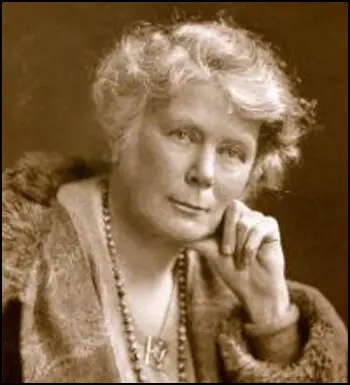
On this day in 1893 anti-slavery campaigner Mary Ann Cary died.
Mary Ann Cary was born in Wilmington, Delaware, on 9th October, 1823. The oldest of 13 children she moved to Canada after the passing of the Fugitive Slave Act in 1851.
While based in Toronto she published and edited the anti-slavery newspaper, Provincial Freeman. The newspaper included several articles illustrating the role played by women in the emancipation struggle and argued against all forms of gender discrimination.
In 1869, at the age of forty-six, became the first woman student at the Howard University Law School. While studying for her degree Cary worked with Frederick Douglass on the National Era newspaper.
Cary's articles often dealt with women's suffrage and in 1871 she and sixty-three other women attempted to register to vote in Washington. Cary was also the founder of the Colored Women's Progressive Franchise Association in 1880.
In her final years Cary campaigned for training programmes for equal rights, an increase in the number of occupations open to women, co-operative stores and local labour bureaus.
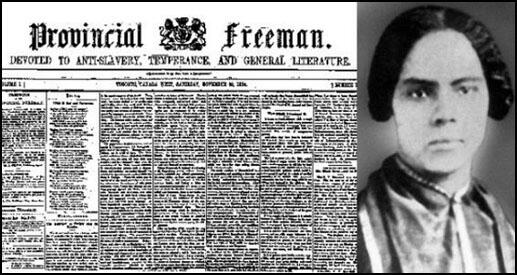
On this day in 1883 John Maynard Keynes, the eldest of three children, was born at 6 Harvey Road, Cambridge. His father, John Neville Keynes was an economist who taught at Cambridge University. His mother, Florence Keynes had been educated at Newnham College and was the city's first woman mayor. His father inherited money just before his marriage and the family lived very comfortably.
Alexander Cairncross, has pointed out: "The family kept three servants - a cook, a parlour maid, and a nursery maid - and there was a German governess. In his first few years Maynard was a sickly child, suffering to begin with from frequent attacks of diarrhoea and thereafter from feverishness... In the summer of 1889 he had an attack of rheumatic fever and a few months later he had to give up attending his kindergarten for a time, suffering from what was diagnosed as St Vitus's dance."
In 1897 Keynes was entered for the Eton College scholarship examination and attained the tenth out of fifteen places and was first equal in mathematics. Keynes was a prodigious prize winner at Eton. He won 10 in his first year, 18 in the second, 11 in his third. His brother, Geoffrey Keynes, commented that his father "set great store by our marks and position in class, and this stimulated a sense of competition in Maynard, who enjoyed his own capacity of leaping ahead of other boys."
In his final year Keynes won an Eton scholarship to King's College, in mathematics and classics. One of his tutors was Alfred Marshall. He also came under the influence of George Edward Moore, who was ten years his senior. Moore was a Fellow of Trinity College. Keynes wrote after attending one of Moore's lectures: "I have undergone conversation, I am with Moore absolutely and on all things - even secondary qualities... Something gave in my brain and I saw everything clearly in a flash." In another letter, he wrote "one hardly feels prepared to disagree with Moore on everything."
Keynes was invited to join the Apostles, a small, secret society of dons and undergraduates who met to discuss ethical and political issues. He was initiated into the Society in February, 1903. The group included Lytton Strachey, Bertrand Russell, Roger Fry, Leonard Woolf and E. M. Forster. Russell later commented: "It was owing to the existence of the Society that I soon got to know the people best worth knowing."
Alec Cairncross has attempted to explain the beliefs of the Apostles: "The key difference in the attitude of Keynes and his friends was that the basis of the calculus of moral action was seen as exclusively personal, not as rules imposed from without. There could be no objective measure of what was good since, if the good consisted of states of mind, these states could be known and judged only by the minds in question. Duty, action, social need simply did not enter. Intuitive judgements were all one could turn to."
Keynes friendship with Woolf and Russell brought him into contact with leaders of the Fabian Society, including Sidney Webb, Beatrice Webb and George Bernard Shaw. He also became friends with Rupert Brooke, another member of the Fabians. Unlike most of his friends, Brooke was "strongly heterosexual". When he visited Brooks he "found him sitting in the midst of admiring female Fabians with nothing on but an embroidered sweater."
John Maynard Keynes remained a strong supporter of the Liberal Party. He made his first contribution to the Cambridge Union Debating Society on 4th November 1902. The President of the Union, Edwin Montagu, was so impressed that he invited him to be one of the main speakers a fortnight later. Montagu was taken more by Keynes's logic than by his delivery, which was not impressive. He also met Edward Grey who was senior figure in the party. He told his friend, Bernard Swithinbank, whom he considered Grey a "very commanding and reliable statesman" and admitted that he had become "quite political... a most amusing game and a very fairly adequate substitute for bridge".
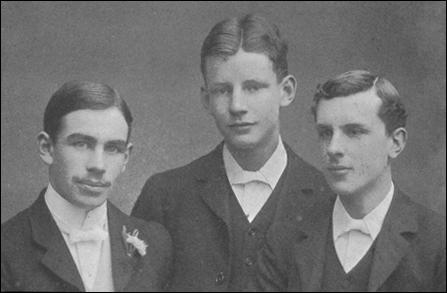
Gerald Mackworth Young at Cambridge University.
On this day in 1906 Evelyn Sharp writes love letter to Henry Nevinson. "All through I have wanted you so terribly to be sure that I should never disappoint you. It is magnificent thing to be made Queen by the man who made me a woman. But for you I should never have discovered the meaning of womanhood... I have never done anything to deserve that life should have given me you."
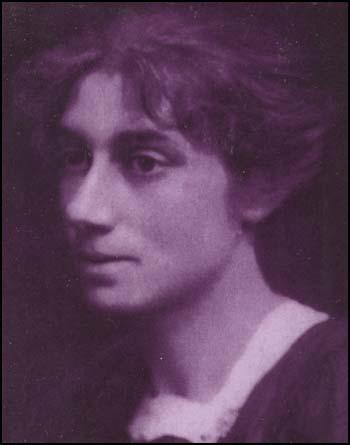
On this day in 1916 Earl Horatio Kitchener, Secretary of State for War, was drowned when the HMS Hampshire on which he was traveling to Russia, was struck a mine off the Orkneys. C. P. Scott, the editor of the Manchester Guardian, remarked: "he could not have done better than to have gone down, as he was a great impediment lately".
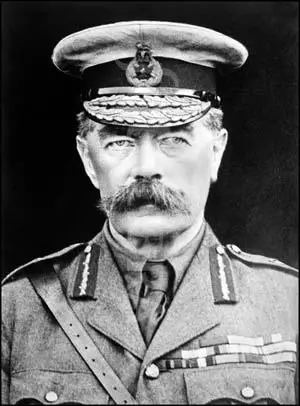
On this day in 1921 trade union leader Will Crooks, who had never moved away from his house in Poplar, died in London Hospital, Whitechapel.
William Crooks, the son of a ship's stoker, was born in a one-room house Poplar, East London, on 6th April, 1852. When he was three years old, William's father lost an arm when a ship's engine was started when he was oiling the machinery. Unable to find regular work because of his disablement, the family had to rely on the earnings of Mrs. Crooks work as a seamstress.
In 1861 Mr. Crooks and the five youngest children, including William, were forced to enter the Poplar Workhouse. Eventually Mrs. Crooks was able to find enough work and a cheaper room and the family were reunited. These experiences had a dramatic impact on Crooks and helped to influence his strong views on poverty and inequality.
Mrs. Crooks, despite being illiterate herself, encouraged her children to go to school. Although always short of money, Mrs. Crooks found the penny a week needed to educate William at George Green School on the East India Dock. She was also a deeply religious woman and the whole family attended the local Congregational Church.
As soon as he was old enough, William found work as a errand boy at a grocer's for two shillings a week. This was followed by a period as a blacksmith's labourer, but in 1866 Mrs. Crooks was able to arrange for the fourteen year old William to be apprenticed to a copper. Crooks was an avid reader and as a teenager discovered the works of Charles Dickens. He also began reading radical newspapers and found out about the campaigns of reformers such as John Bright and Richard Cobden.
Will Crooks impressed his fellow workers were impressed with his knowledge and asked him to speak to their boss about the excessive overtime they had to work. Crooks agreed to do this but as a result of the meeting he was sacked as a political agitator. Crooks, whose young wife had just had their first child, was forced to leave the area in search of work. Eventually Crooks found work in Liverpool. His family joined him but within a month his child died and Crooks and his wife returned to London.
Crooks found work as a casual labourer at East India Docks. Every Sunday morning he gave lectures on politics at the dock gates in Popular. Subjects of his lectures, at what became known as Crooks' College, included trade unionism, temperance and co-operative societies. John Robert Clynes later recalled: "Will Crooks combined the inspiration of a great evangelist with such a stock of comic stories, generally related as personal experiences, that his audience alternated between tears of sympathy and tears of laughter. I know of no stage comedian who can move his audience today to such roars of merriment as could Will Crooks, when he related the human incidents that formed so valuable a part of his platform stock. I once heard him say that a non-Union workman who tried to gain personal advancement at the expense of his mates was like a man who stole a wreath from his neighbour's grave and won a prize with it at a flower show!"
When the London Dock Strike started in August 1889, Crooks used his considerable skills as an orator to help raise funds for the dockers. Over the next few weeks Crooks emerged with Ben Tillett, Tom Mann and John Burns as one of the four main leaders of the strike. The employers hoped to starve the dockers back to work but other trade union activists such as Will Thorne, Eleanor Marx, James Keir Hardie and Henry Hyde Champion, gave valuable support to the 10,000 men now out on strike. Organizations such as the Salvation Army and the Labour Church raised money for the strikers and their families. Trade Unions in Australia sent over £30,000 to help the dockers to continue the struggle. After five weeks the employers accepted defeat and granted all the dockers' main demands.
The London County Council (LCC) was created as a result of the 1888 Local Government Act. The LCC was the first metropolitan-wide form of general local government. Crooks became Progressive Party candidate for Poplar. Elections were held in January 1889 and the Progressive Party, won 70 of the 118 seats. Crooks won in Popular and other leaders of the labour movement including Sidney Webb John Burns and Ben Tillett, joined him in the LCC.
In 1892 Crooks' wife died, leaving him with six children. A year later he married Elizabeth Lake, a nurse from Gloucestershire. Crooks became chairman of the Public Control Committee and in this post promoted fair wages for LCC employees and the Infant Life Protection Bill which ended baby-farming in London. Crooks also became the first working-class member of the Poplar Board of Guardians.
Crooks became chairman of the Board of Guardians in 1897 and with the aid of his fellow member and friend, George Lansbury, began the task of reforming how the Popular Workhouse was run. Corrupt and uncaring officials were sacked, and the food and education that the inmates received were improved. Every effort was made to find homes for the young orphans in the workhouse. Crooks and Lansbury were so successful that the Poplar Workhouse became a model for other Poor Law authorities.
Crooks also became a member of the Poplar Borough Council and in 1901 became the first Labour mayor of London. He also helped establish the National Committee on Old Age Pensions. Influenced by the ideas first expressed by Tom Paine in The Rights of Man, Crooks believed that pensions were the only way to keep the elderly poor from entering the workhouse.
In 1903 the Labour Representation Committee invited Crooks to stand as their candidate in a by-election in Woolwich. Crooks had made many friends in the Liberal Party during his time on the London County Council and they withdrew their candidate from the election. During the campaign Crooks argued against the Taff Vale decision and the 1902 Education Act and urged the government to take measures to help the unemployed and those workers on low wages. Although normally a safe Conservative seat, the support of the Liberals enabled Crooks to obtain an easy victory.
After his election Crooks continued to live in his house in Poplar. He argued that it was important that he continued to retain his links with the working-class. In the House of Commons Crooks concentrated on the issue of unemployment. He supported the Unemployment Bill introduced by Arthur Balfour in 1905 and controversially advocated compulsory agricultural work for the able-bodied unemployed.
Crooks was re-elected in the 1906 General Election and for the next four years supported the reforming Liberal administrations led by Henry Campbell-Bannerman (1906-1908) and Herbert Asquith (1908-1910). Will Crooks was defeated in the January 1910 General Election but returned to the House of Commons in the election held in December, 1910.
Unlike most of the leaders of the Labour Party, Crooks enthusiastically supported Britain's involvement in the First World War. He participated in the recruiting campaign and toured the Western Front in an effort to boost the morale of troops. In one speech Crooks declared that he "would rather see every living soul blotted off the face of the earth than see the Kaiser supreme anywhere."
Will Crooks won the seat in the 1918 General Election but he was forced to retire from his seat in February 1921, due to ill-health.
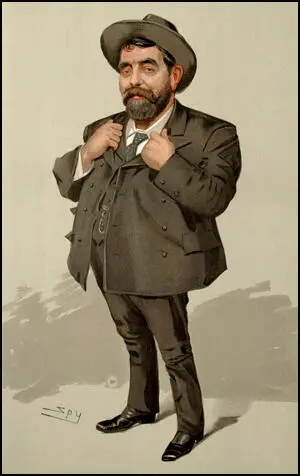
On this day in 1940 J. B. Priestley became the presenter of Postscripts, a BBC Radio radio programme that followed the nine o'clock news on Sunday evenings. Priestley built up such a following that after a few months it was estimated that around 40 per cent of the adult population in Britain was listening to the programme.
On 21st July, 1940, he argued: "We cannot go forward and build up this new world order, and this is our war aim, unless we begin to think differently one must stop thinking in terms of property and power and begin thinking in terms of community and creation. Take the change from property to community. Property is the old-fashioned way of thinking of a country as a thing, and a collection of things in that thing, all owned by certain people and constituting property; instead of thinking of a country as the home of a living society with the community itself as the first test."
Graham Greene pointed out: "Priestley became in the months after Dunkirk a leader second only in importance to Mr Churchill. And he gave us what our other leaders have always failed to give us - an ideology." Some members of the Conservative Party complained about Priestley expressing left-wing views on his radio programme. Margaret Thatcher has argued that "J.B. Priestley gave a comfortable yet idealistic gloss to social progress in a left-wing direction." As a result Priestley made his last talk on 20th October 1940. These were later published in book form as Britain Speaks (1940).
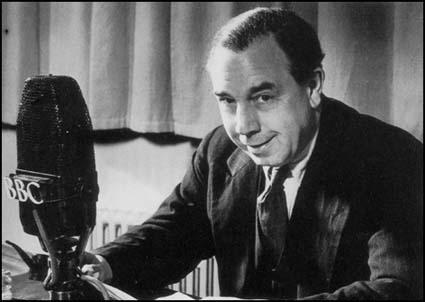
On this day in 1945 Clement Attlee makes General Election radio broadcast.
The Prime Minister made much play last night with the rights of the individual and the dangers of people being ordered about by officials. I entirely agree that people should have the greatest freedom compatible with the freedom of others. There was a time when employers were free to work little children for sixteen hours a day. I remember when employers were free to employ sweated women workers on finishing trousers at a penny halfpenny a pair. There was a time when people were free to neglect sanitation so that thousands died of preventable diseases. For years every attempt to remedy these crying evils was blocked by the same plea of freedom for the individual. It was in fact freedom for the rich and slavery for the poor. Make no mistake, it has only been through the power of the State, given to it by Parliament, that the general public has been protected against the greed of ruthless profit-makers and property owners.
Forty years ago the Labour Party might, with some justice, have been called a class Party, representing almost exclusively the wage earners. It is still based on organised labour, but has steadily become more and more inclusive. In the ranks of the Parliamentary Party and among our candidates you will find numbers of men and women drawn from every class and occupation in the community. Wage and salary earners form the majority, but there are many from other walks of life, from the professions and from the business world, giving a wide range of experience. More than 120 of our candidates come from the Fighting Services, so that youth is well represented.
The Conservative Party remains as always a class Party. In twenty-three years in the House of Commons, I cannot recall more than half a dozen from the ranks of the wage earners. It represents today, as in the past, the forces of property and privilege. The Labour Party is, in fact, the one Party which most nearly reflects in its representation and composition all the main streams which flow into the great river of our national life.
Our appeal to you, therefore, is not narrow or sectional. We are proud of the fact that our country in the hours of its greatest danger stood firm and united, setting an example to the world of how a great democratic people rose to the height of the occasion and saved democracy and liberty. We are proud of the self-sacrifice and devotion displayed by men and women in every walk of life in this great adventure. We call you to another great adventure which will demand the same high qualities as those shown in the war: the adventure of civilisation.
We have seen a great and powerful nation return to barbarism. We have seen European civilisation almost destroyed and an attempt made to set aside the moral principles upon which it has been built. It is for us to help to re-knit the fabric of civilised life woven through the centuries, and with the other nations to seek to create a world in which free peoples living their own distinctive lives in a society of nations co-operate together, free from the fear of war.
We have to plan the broad lines of our national life so that all may have the duty and the opportunity of rendering service to the nation, everyone in his or her sphere, and that all may help to create and share in an increasing material prosperity free from the fear of want. We have to preserve and enhance the beauty of our country to make it a place where men and women may live finely and happily, free to worship God in their own way, free to speak their minds, free citizens of a great country.
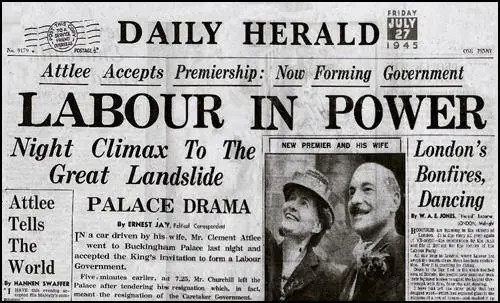
On this day in 1945 the Daily Mirror urges its readers to vote Labour in the 1945 General Election. On 23rd May, 1945, Winston Churchill resigned as Prime Minister and requested the dissolution of Parliament. In the last General Election it had supported Stanley Baldwin and the Conservative Party. This time it was going to be very different. It campaigned very strongly for the Labour Party and unlike most newspapers, gave its full support to the implementation of the Beveridge Report that "the proposals for social security" that "marks a big step forward in the social reconstruction of the country".
On the day of the 1945 General Election, the Daily Mirror reproduced Philip Zec's VE-Day cartoon of a bloodied and bandaged soldier thrusting a victory laurel wreath. Next to it was an article calling for the people to vote for the Labour Party: "We reproduce on this page Zec's famous VE-Day cartoon. We do so because it expresses more poignantly than words could do the issues which face the people of this country today... Vote on behalf of the men who won the victory for you. You failed to do so in 1918. The result is known to all. The land 'fit for heroes' did not come into existence. The dole did. Short-lived prosperity gave way to long, tragic years of poverty and unemployment. Make sure history does not repeat itself."
Roy Greenslade has argued: "The slogan was cleverly aimed at the wives, girlfriends and mothers of servicemen abroad, many of whom were voting for the first time. They would, naturally, wish to do well by the men yet to return, many of whom were angry that they would have no opportunity to vote. The slogan was cleverly aimed at the wives, girlfriends and mothers of servicemen abroad, many of whom were voting for the first time. They would, naturally, wish to do well by the men yet to return, many of whom were angry that they would have no opportunity to vote. The slogan also gave political expression to the demobbed troops worried about their futures and, with great subtlety, tapped into the sense of comradeship they had experienced. The vote was for others, not just for oneself."
When the poll closed the ballot boxes were sealed for three weeks to allow time for servicemen's votes (1.7 million) to be returned for the count on 26th July. It was a high turnout with 72.8% of the electorate voting. With almost 12 million votes, Labour had 47.8% of the vote to 39.8% for the Conservatives. Labour made 179 gains from the Tories, winning 393 seats to 213. The 12.0% national swing from the Conservatives to Labour, remains the largest ever achieved in a British general election. It came as a surprise that Winston Churchill, who was considered to be the most important figure in winning the war, suffered a landslide defeat. It was suggested at the time that the Mirror's "Vote For Him" campaign "may well have won more votes for the Labour party than any other journalistic enterprise".
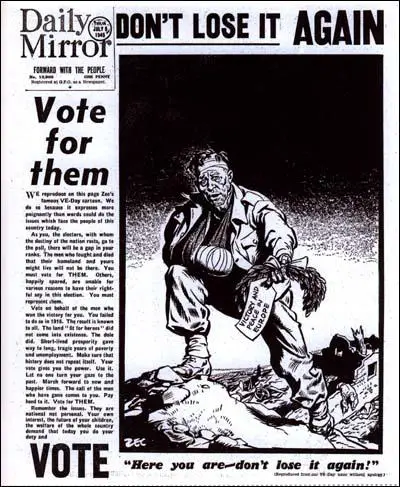
A copy of this newspaper can be obtained from Historic Newspapers.
On this day in 1963 John Profumo resigns after admitting he lied about Christine Keeler. In a letter to Harold Macmillan he said: "You will recall that on 22 March, following certain allegations made in Parliament, I made a personal statement. At the time rumour had charged me with assisting in the disappearance of a witness, and with being involved in some possible breach of security. So serious were these charges that I allowed myself to think that my personal association with that witness, which had also been the subject of rumour, was by comparison of minor importance only. In my statement I said that there had been no impropriety in this association. To my very deep regret I have to admit that this was not true, and that I misled you, and my colleagues, and the House. I ask you to understand that I did this to protect, as I thought, my wife and family, who were equally misled, as were my professional advisers. I have come to realize that, by this deception, I have been guilty of a grave misdemeanour and despite the fact that there is no truth whatever in the other charges, I cannot remain a member of your Administration, nor of the House of Commons. I cannot tell you of my deep remorse for the embarrassment I have cause to you, to my colleagues in the Government, to my constituents, and to the Party which I have served for the past twenty-five years."
